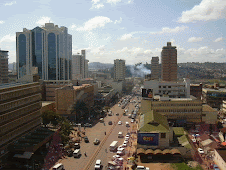
The recently adjourned, World Economic Forum for Africa at Cape Town's International Convention Centre was themed,“Capitalising on Opportunity”. The continent's first staging of The Fifa World Cup™ in 2010 was a major focus of the three-day forum, as the event is seen as 'arguably the biggest opportunity for the re-branding and reinforcing of a positive image of Africa'.
On Thursday, the panel that included, Mark Lamberti, chairperson of Massmart (SA), Wendy Luhabe, chairperson of of the Industrial Development Corporation (SA), Betty Maina, CE of the Kenya Association of Manufacturers, and Simon Kolawale, editor of Nigeria's This Day tackled the subject of crime. Well known, to be one of South Africa's major concerns, the panelists however, disagreed with the notion of crime being a uniquely South African problem, and instead labelled it a 'continent-wide crisis'. While a variety of competing explanations were offered in discussing the problem, Wendy Luhabe felt crime was a function of poverty and inequality. 'Africa is a wealthy continent, but its people are poor. Millions of Africans live on less than a dollar a day. This obscene economic gap is responsible for the high levels of crime and corruption,' she said. Lamberti, hoever, argued that South Africa's high levels of crime were a consequence of the parlous state of the criminal justice system on the one hand, and on the other, a consequence of social ills. Lamberti also pointed out that many countries , like India and China, have horrific poverty and inequality without our crime levels. It appears then, the crime problem is not easily explained away. It is an insidious problem, that is the product of a combination of factors, but how is it best tackled?
President Mbeki, earned the headline, 'Target: Mbeki' from Independent Newspapers after he publicly disagreed with the forum about there being a crisis of leadership on the continent. While President Mbeki's oft-published caricature as an ostrich-type figure, with its head in the sand while the world about him falls apart, would certainly deter the President himself from being a shining beacon of African leadership, he would not accept the criticism or the generalisations about the continent's leadership."There is much better clarity in the political leadership on the continent," he maintained. "There is greater clarity on how to respond to economic challenges. And there is an appreciation of the need to deal with conflict." In terms of governance, the continent was "evolving in the correct direction".While avoiding any mention of Zimbabwe, he used Nigeria as an example of the way the quality of leadership had changed. Mbeki told delegates that military strongman Sani Abacha had lied to him about the fate of activist Ken Saro Wiwa, promising he would not be harmed, only to hang him once he (Mbeki) left Nigeria. All these years later, Nigeria was developing in a good and positive way, with President Umaru Yar'Adua reviewing the electoral system.
Coca-Cola chairperson Neville Isdell, a speaker at the closing session of the forum, said he agreed with President Mbeki in that there has been change. This is underscored by the level of economic growth and investment in Africa. One can identify where improvement is taking place by looking where investment is going.There is also change at another level, in the growth of a middle class and a new educated elite, who have shaken off the shackles of the past and have a new view of Africa.This in itself has begun engineering democratic change and also underpins it.















2 comments:
You are right Khadijja on this. What those panelists point out is true. Even Mbeki's assertions to a great extent are right. But that said, there is an admission by all those guys that many things are still wanting. That now brings us to what the press should do: gloat and gloss over the meagre positives or hype a great deal about the flaws, with the hope that this can change things---I again, leave that in your court
Wanyama, not glossing the reality.But if we agree to an exposition of the overriding realities, then we publish it all, the good, the bad and the ugly.
Post a Comment